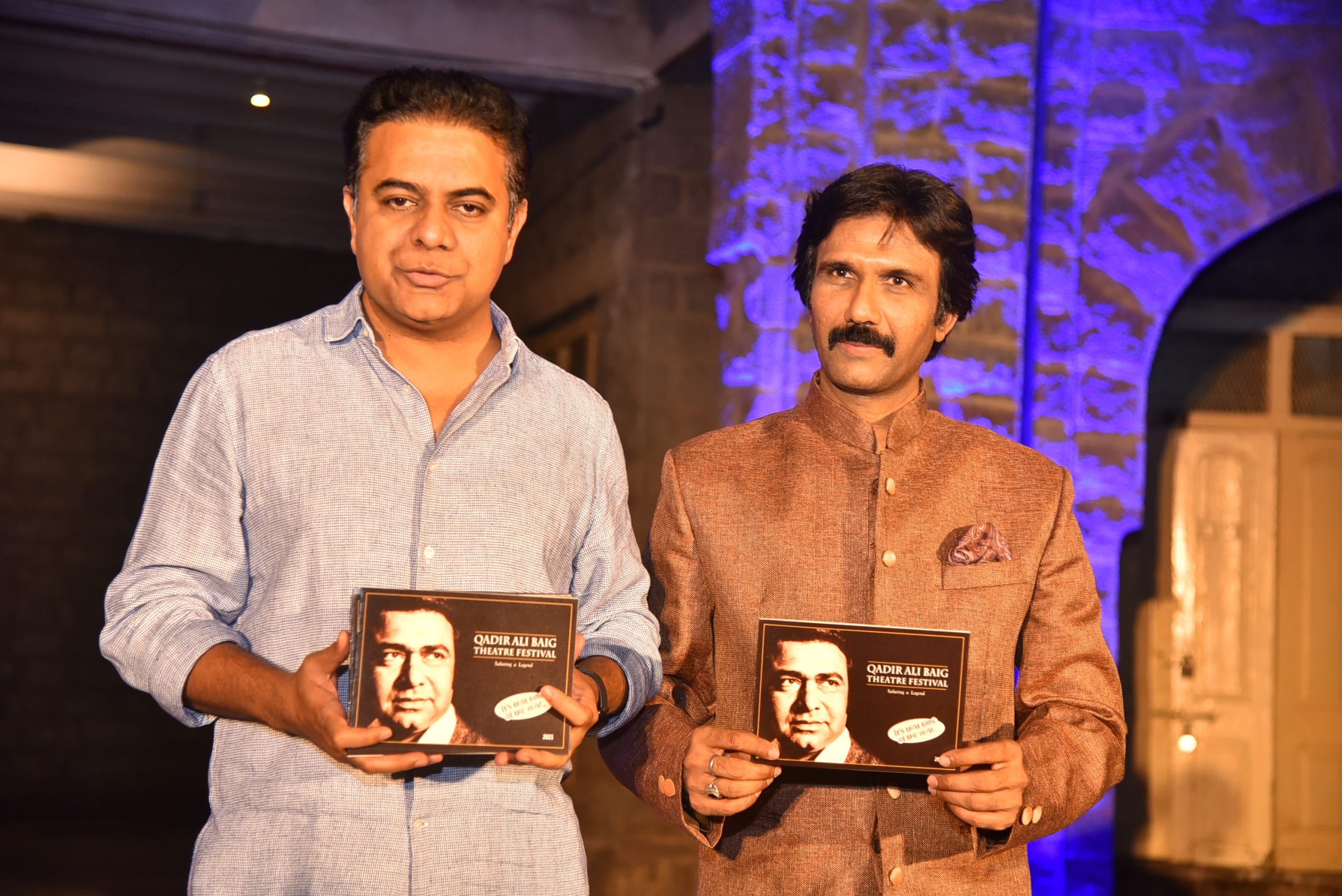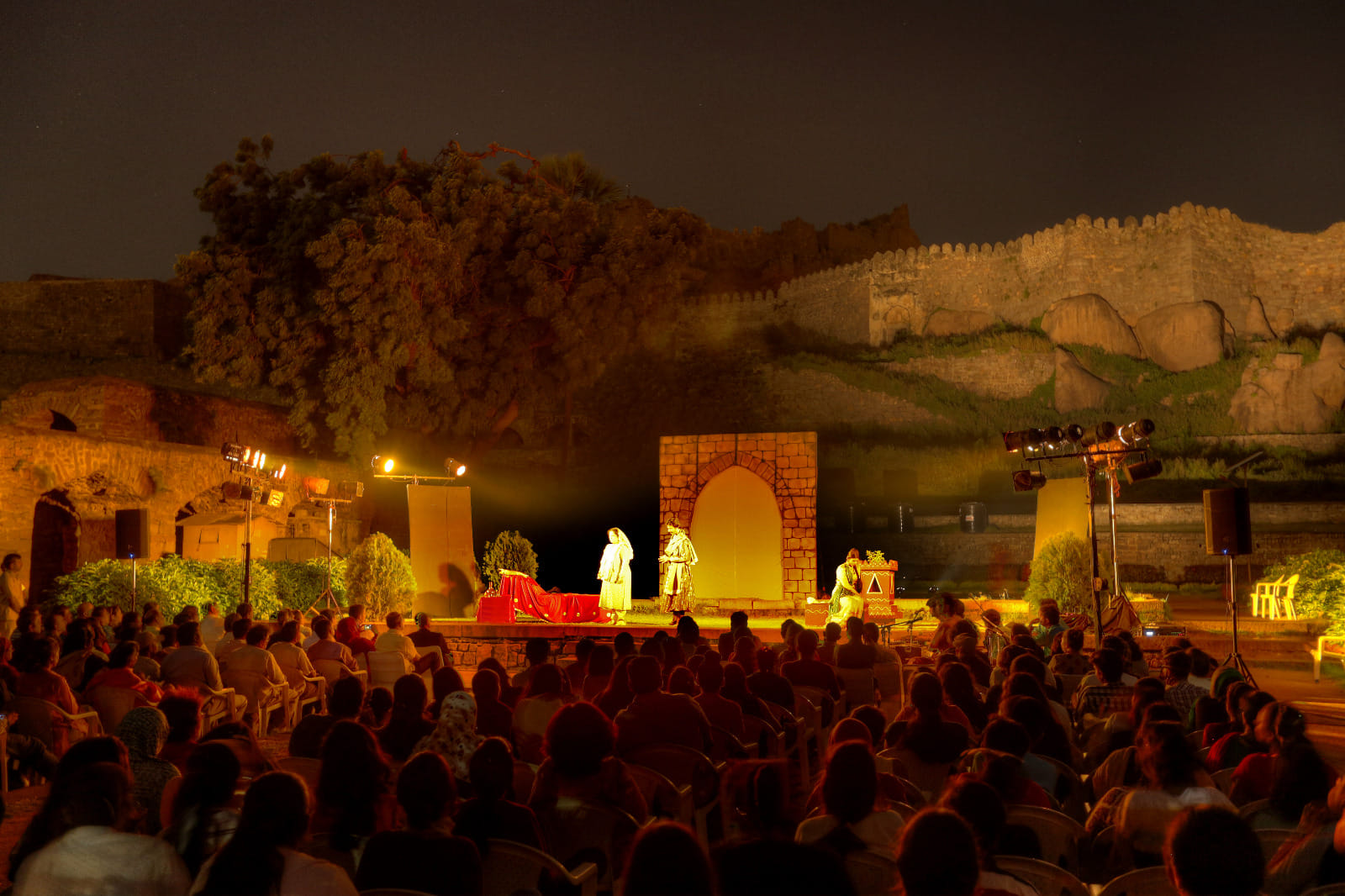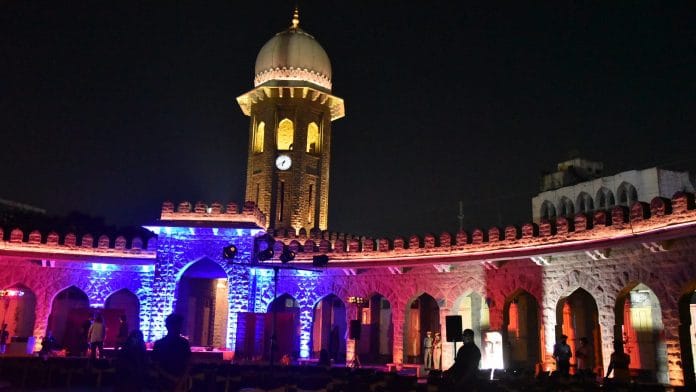In the 85-year-old courtyard of a Hyderabad fruit market built as a tribute to a poet prince, the Qadir Ali Baig Theatre Festival, once again, proved this week that Indian theatre can thrive even in trying times and Netflix-ridden pandemic.
The Qadir Ali Baig Theatre Festival is to Hyderabad what the International Film Festival of India (IFFI) is to Goa, what Cannes is to France — and this Thursday, it opened for its sixteenth year with all the necessary Covid-safety protocols in place. It was the only theatre festival in India to take place last year during the pandemic, though scaled down.
The festival productions usually are staged in iconic locations like Golconda Fort, Chowmahalla Palace, and Falaknuma Palace. This year is no exception: opening night took place in the recently restored Moazzam Jahi Market, known for its grand entrance, huge stone edifice, and high clock tower. Built by the last Nizam of Hyderabad Mir Osman Ali Khan, the fruit market is named after his son Moazzam Jah, who used to hold court for poets from all over India to recite poetry and sing ghazals and bhajans all night.
With support from the government of Telangana, the festival’s opening ceremony kicked off with Prince Moazzam Jah’s poetry, read by Mohammad Ali Baig – who heads the Qadir Ali Baig Theatre Foundation – and his nazms sung by Mala Bararia.
Telangana IT minister K.T. Rama Rao released the festival brochure, which was followed by an opening play. Rao has called the flagship theatre event a “feather in the cap of Telangana.”

The festival opened with the first act of a play titled ‘Guards At The Taj’, directed by Shishir Singh Chauhan, a play about power, resistance, the appreciation of beauty, and the spectre of authoritarianism.
“This play is a great metaphor for when you become too chained by the system. It leads you to be blinded against humanity,” said actor, poet and theatre director Danish Hussain. His version of the play has been staged at theatre festivals like Aadyam.
The events will take place at two venues — the market and the Radisson Blu hotel — over five days instead of the usual ten. It will showcase Hindi, English and Telugu plays as well as classes and workshops on physical theatre, playwriting, and heritage theatre led by artistes such as Ila Arun, Heeba Shah, and Etienne Coutinho.
Also read: Ebrahim Alkazi, pioneer who shaped not just many fine actors but India’s modern theatre scene
The cultural space is changing
Prithviraj Kapoor once said in the Rajya Sabha in 1952, “Theatre is a wonderful thing. It is the greatest temple on earth. In that temple, Hindu, Muslim, Christian, Jew, Sikh and Parsi all get together. Nobody comes and asks who is in the next chair…all sit together.”
His grandson, actor Kunal Kapoor, who is also a trustee of the famous Prithvi Theatre in Mumbai, wrote to ThePrint over email that, unfortunately, India doesn’t have the right kind of support and patronage for the arts yet. “Personally, I’m confident that a city like Mumbai can easily accommodate another fifteen Prithvi Theatres — as long as they are managed with the same values,” he wrote.
Having performed everywhere from Lahore to London, Baig said that the space for cultural events isn’t shrinking, audiences are just looking for convenience.
But don’t hold a funeral yet, theatre is not dead.
The cultural space might be contested, but it’s certainly not cancelled. Even as big cinema struggles to make a vaccinated comeback after Covid, theatre just seems like an indulgence and a long shot. But talk of the era of theatre dying is premature, many say. The “bechare theatrewale” tag is unfortunate and should have been countered long back, said Baig.
“Somebody should tell me when theatre is dead so I can participate in its funeral,” Danish Hussain said.
Between the two lockdowns, Prithvi Theatre experienced its 2019 average of an 80 per cent audience attendance, Kunal Kapoor, who is also the son of actor Shashi Kapoor, wrote.
“Please come and have a look at the motley collections of audience members queuing up before the shows,” Kapoor added.
Also read: Hyderabad is India’s ‘most liveable city’ but it’s deprived of the title
Hyderabad’s history through the festival – ‘Historyonics’
One of Baig’s most popular plays is ‘Quli: Dilon ka Shahzaada’, his own version of the love story of the poet-king Quli Qutub Shah and his beloved Bhagmati. It had a successful run at Edinburgh’s Fringe Festival, and has also been performed in front of audiences at Hyderabad’s landmark Golconda Fort.

Baig also pointed out that Hyderabad is known for its cosmopolitanism, with Telugu, Mughlai, and Iranian influences blending together to create a culture that is unique to the city. Quli Qutb Shah, who founded the city of Hyderabad and built the Charminar, was a poet who wrote in Persian, Urdu and Telugu.
“The festival is also to celebrate Hyderabad, and revisit what it stood for over four centuries. With all my conviction of being Hyderabadi,” said Baig. During the first wave of the Covid-19 pandemic, the Qadir Ali Baig Foundation reached out to everyone – from actors to daily-wage stage craftspersons – and provided monetary support to over 300 families. When the lockdown eased, they held the festival following all the safety protocols and with support from the Telangana government.
Many veterans have staged comebacks and new actors have debuted at the Qadir Ali Baig Theatre Festival. Alyque Padamsee was shivering backstage before his first performance in 20 years. Pankaj Kapur held Baig’s hand and thanked him before walking on stage after 18 years.
“For me, theatre is a legacy, a huge responsibility — it’s not my vocation or passion. What began as a son’s tribute to his father 16 years ago is a city’s festival today,” said Baig.
The author tweets @vandana_menon. Views are personal.
(Edited by Prashant)






